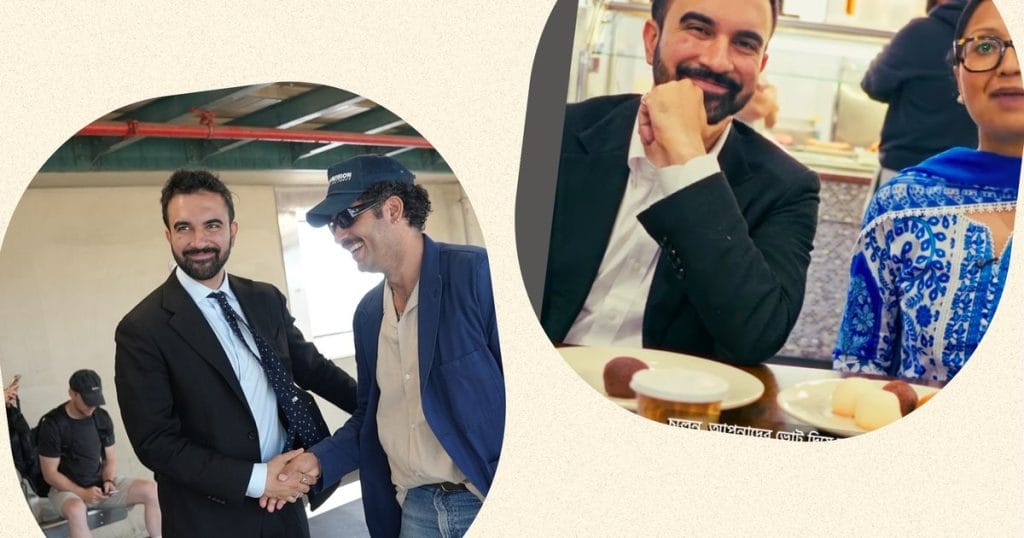
The opinions expressed in this article are the author’s own and do not reflect the views of Spoon University.
The power of food is far more than just fuel for the body. It is a sustenance for the physical and cultural self. It acts as a powerful lens through which cultural identity is portrayed and political freedom is expressed. For many immigrants and diaspora communities, traditional food carries stories of resilience and belonging, serving as a bridge between activism and cultural pride. New York State assembly member and New York City mayoral candidate Zohran Mamdani’s campaign slogan, “Roti and Roses” captures this theme by intertwining food and activism in a way that speaks to Gen Z’s understanding of cultural identity. This phrase symbolizes the merging of important cultural practices, like how eating roti can connect to bigger struggles for justice — it’s not just a staple food but a reminder of tradition that communities hold onto despite the social and political changes constantly evolving in our everyday lives. It shows that food isn’t just something we need to live, but a way to pride in who we are. Zohran Mamdani won the democratic primary last night and will face the general election this November.
Born to Uganda-Indian immigrant parents, Mamdani’s diverse background shapes both his personal identity and his political goals. His cultural immigrant background explains why he speaks up for people who are left out, especially people within the working class communities.
As he campaigns for mayor, Mamdani connects cultural heritage to a broader political vision that resonates with Gen Z. Food has become a symbol for young people especially Gen Z as they start to see their cultures become represented in politics.
Roti, a traditional flat bread staple in South Asian and East African cuisines, is considered more than a meal, but a symbol representing the endurance of community identity within foreign lands. In Mamdani’s campaign, roti stands for cultural continuity. His roots connect him to the practice of using food to resist assimilation and maintain pride in one’s culture. The theme isn’t just a slogan — it’s something that Mamdani has expressed creatively on social media for several years. In a 2019 music video shared on YouTube, Mamdani uses his rap name “Mr Cardamom” to work with Indian cookbook author Madhur Jeffrey. In the video, she holds a plate of roti while taking part in the performance. This video challenges stereotypes by featuring Madhur Jeffrey confidently rapping and breaking norms about age and culture. Showcasing that cultural traditions are living, powerful forms of activism by using roti as a tool to resist cultural erasure. Mamdani’s creative video showcases humor, music, and food to celebrate culture, showing how roti can be a powerful symbol of both identity and activism.
The symbolism of “Roti and Roses” represents two things: roti symbolizes cultural pride and tradition and roses symbolizes hope and political change. Through this, we can see how Madani’s campaign uses food to continuously connect heritage and activism. For example, in 2021 during Ramadan, Mamdani organized food distribution events in collaboration with local mosques and community organizations. He also partnered with state senator Micheal Gianaris to distribute meals to those in need at the Al-Iman Mosque in Astoria, Queens. This type of initiative demonstrates how Mamdani connects cultural heritage with activism. He also uses his platform to address other important issues, such as the rising cost of halal food, which he terms “halal inflation,” a crisis specifically affecting immigrant communities. This “halalflation” makes street food less affordable. Mamdani also highlighted this economic struggle as a key issue, telling Eater, “Chicken over rice now costs $10 or more. It’s time to make halal $18 bucks again”. By focusing on this issue, Mamdani shows how economic problems affect cultural traditions, which is where his slogan “Roti and Roses” comes in. It represents cultural pride and hope for change. When he says it’s time to make halal affordable again, he means that keeping culture alive also means fighting for fair prices and economic fairness.








